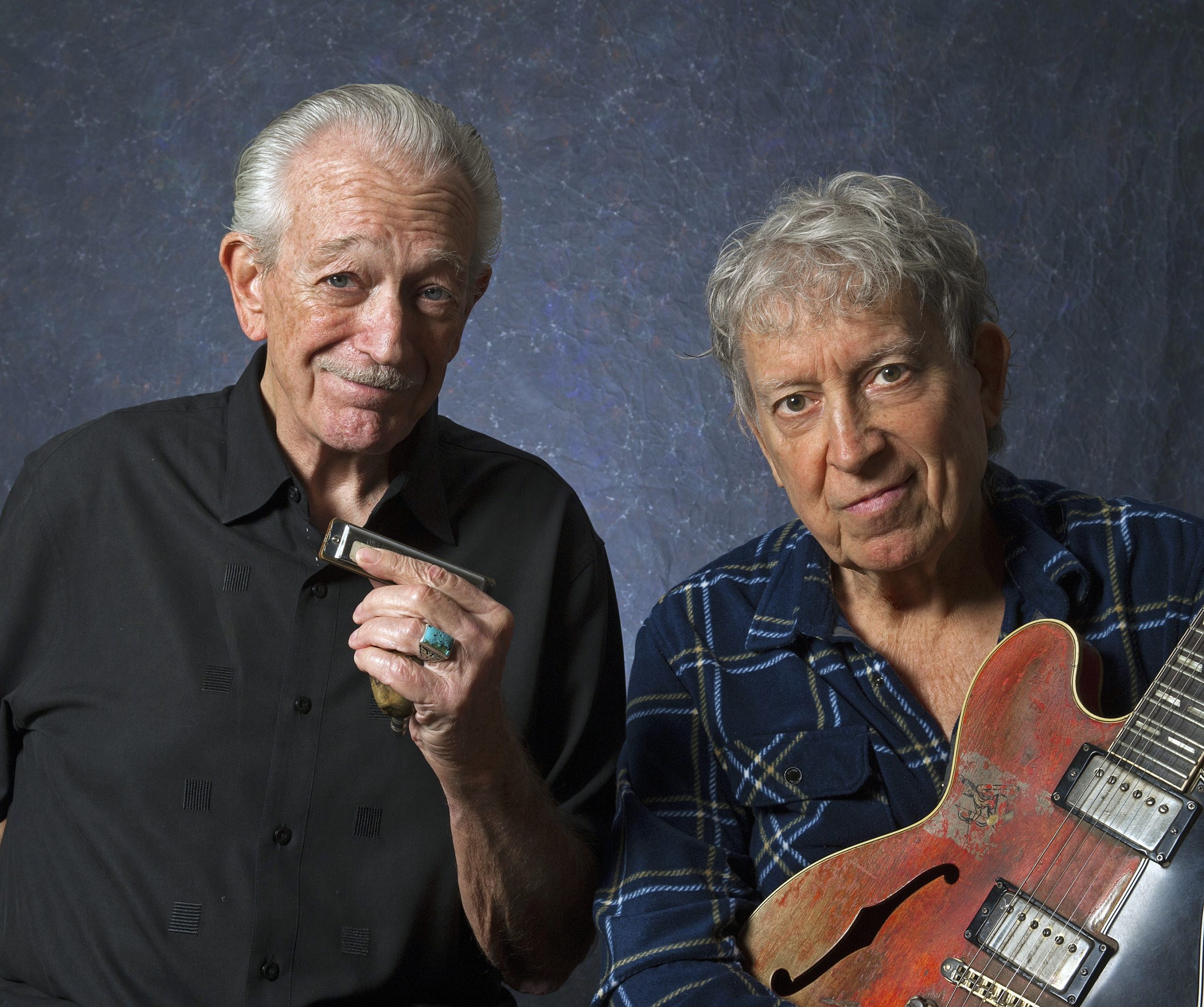Reflections: Elvin Bishop and Charlie Musselwhite

It seems impossible but it’s true: 100 Years of Blues, the new Alligator Records release by Elvin Bishop and Charlie Musselwhite, is the first fully collaborative album ever recorded by the two blues veterans. For decades—hence the album title—the pair ran in concentric circles, occasionally running into each other just long enough to give a friendly wave. They did a brief tour of Hawaii together in the ‘80s, but never entertained the notion of working together on a joint project.
The path toward correcting that lingering oversight took root when Musselwhite contributed harmonica and vocals to the original 2017 version of “100 Years of Blues” on the album Elvin Bishop’s Big Fun Trio. That long-delayed meetup led to a handful of live dates together. “We enjoyed the hell out of it,” Musselwhite says, while reflecting on those shows. “We crack each other up laughing, telling stories. It’s like sitting on our front porch with the audience coming to hear us. I hope they get that same feeling from the record. It’s right from the heart; it’s not anything contrived. It’s us being us.”
The new album features Bishop on guitar and vocals, Musselwhite on harmonica, vocals and, surprisingly, slide guitar on one track, Bob Welsh on additional guitar and piano, and Kid Andersen, who also produced the sessions, on upright bass. There aren’t any drums—100 Years of Blues is just a few guys jamming for the fun of it. Among its dozen songs, eight were written by either Bishop or Musselwhite, and three are covers of blues classics. A couple of songs address contemporary issues: the most poignant is Bishop’s “What the Hell?,” originally written in 2005 to address the 9/11 tragedy and now updated for the Trump era. A new version of the jointly penned title track, which recalls the singers’ early days in music, closes out the set.
Bishop and Musselwhite’s paths first crossed on Chicago’s South Side in the early ‘60s. Bishop, who shared lead guitar duties with Mike Bloomfield in the Paul Butterfield Blues Band, came of age in Iowa and Oklahoma, before heading north to attend the University of Chicago. At least that’s what he told his folks.
“I chose that place because I knew that’s where the blues was,” Bishop says. “Basically, school was just my cover story. I immediately made friends with the Black guys that worked in the cafeteria, and the first band that they took me to see was Muddy Waters.”
The 76-year-old Musselwhite, who was born in Mississippi, also set his sights on the Windy City in those heady days. A budding vocalist and harmonica player/ guitarist, he also quickly became immersed in the teeming blues scene. “Chicago was just loaded with the blues,” he says. “You could spend your whole life without seeing the guy who was next door. I’d seen Elvin around and we were aware of each other,” he adds, but the two flew in separate orbits.
Both musicians, from their earliest days as performers, were accepted and befriended by the older Black blues greats. “Little Walter used to give me rides home sometimes,” Musselwhite says of one of his harmonica heroes. “He was just so impressed by some of the places I’d go; they were real rough and I’d come in there by myself. But we didn’t talk about the harmonica. We’d talk about women.”
By the time they’d each left Chicago and settled in the San Francisco Bay Area, both Bishop and Musselwhite had already left their mark thanks to landmark albums: the former with the Butterfield Band’s genre-busting 1966 East-West and Musselwhite with the 1967 smoker Stand Back! Here Comes Charley Musselwhite’s Southside Band. They each became regular sights around their newly adopted city, although Bishop was more likely to be found at one of the larger venues like the Fillmore, while Musselwhite and his bands worked the clubs.
“It was starting to happen,” Bishop says, referring to the San Francisco music scene. “There were more places to play than in Chicago. And the weather [in the Bay Area] was better; it didn’t have that biting wind that kicks your ass. You also didn’t have to wear those damn continental suits. When we got there, the [audiences] wore tie-dye and the girls were all friendly. And you didn’t have to watch your back so much.”
By the ‘70s, Bishop, in particular, had steered his sound more toward goodtime soul-rock, scoring a No. 3 hit nationally with “Fooled Around and Fell in Love” in 1976. Between them, Bishop and Musselwhite have recorded about 60 albums, covering a wide swath of stylistic ground, but neither musician has ever lost his love for the blues—nor his respect for the other artist.
“He’s a hell of a nice guy,” Bishop says about Musselwhite. “He’s a great musician and he’s continued improving. Charlie’s so solid and so real with everything he does; he just opens his mouth and you believe it. We said, ‘It don’t make sense not to do a record.’”
“We were always both real busy with our own bands,” adds Musselwhite, “but we were coming from the same place and making music the same way. Everything we do, the whole approach, is based on our mutual experiences, which were very similar—coming from the South and heading to Chicago, and getting lost in the blues. That’s what it’s all about.”




















